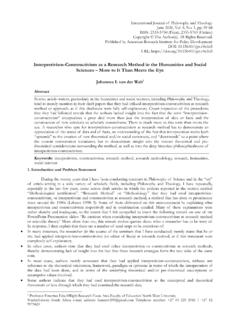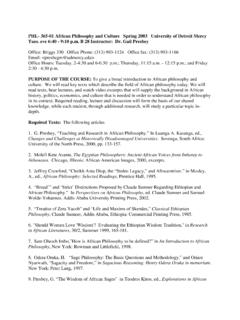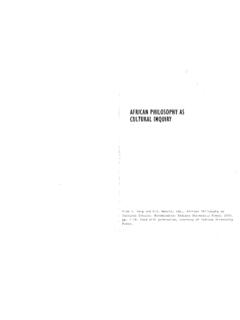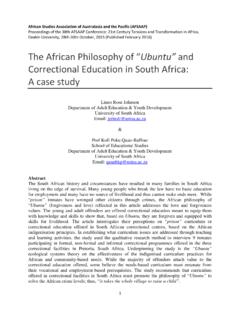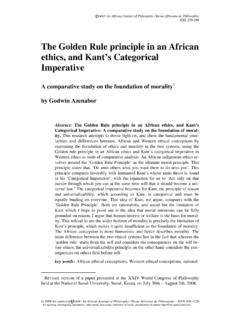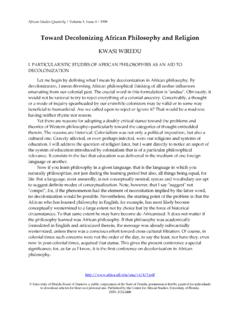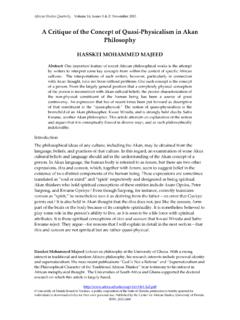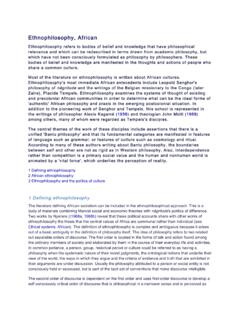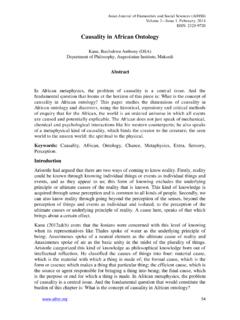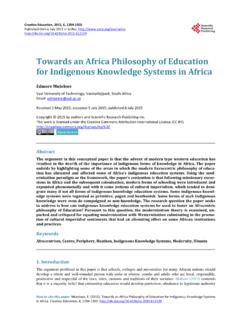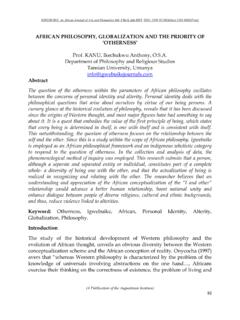Transcription of The Concept of Person in African and Chinese Philosophies ...
1 International Journal of philosophy and Theology September 2014, Vol. 2, No. 3, pp. 121-149 ISSN: 2333-5750 (Print), 2333-5769 (Online) Copyright The Author(s). 2014. All Rights Reserved. Published by American Research Institute for Policy Development DOI: URL: The Concept of Person in African and Chinese Philosophies : A Comparative Inquiry Monday Lewis Igbafen, Abstract What or who is a Person in traditional African communalistic societies and in ancient Chinese Confucian thought system? In response to the question, the paper is a critical analysis of the Concept of Person /individual in African and Chinese Philosophies . In particular, it examines the ontological and normative underpinnings of the Concept of Person or the individual within the context of African and Chinese traditions.
2 As a cross-cultural exercise, the paper brings to focus some existential issues surrounding the varied perspectives of the human Person in those traditions. It aims at establishing some theoretical premises or grounds on which one might appreciate the similarities and differences between African and Chinese traditional cultures. The paper adopts the analytic and expository method of philosophy . Keywords: Traditional African philosophy , Ancient Chinese philosophy , Communalism, Confucianism, Person 1. Introduction Over the years, works in African and Oriental Philosophies have had to contend for recognition as authentic philosophy in the face of the biased Eurocentric claim that only works in the Western philosophical tradition are truly so.
3 In other words, Western philosophy has for long served as the sole yardstick for determining the philosophic content of other acclaimed Philosophies in the African and in the Eastern worlds. 1 Department of philosophy , Faculty of Arts, Ambrose Alli University, 14, EKpoma, Edo State, NIGERIA. E-mail: Mobile phone Nos: +2348030403177 or +1348053279277 122 International Journal of philosophy and Theology, Vol. 2(3), September 2014 The consequence of this experience is that Africa and the Eastern world has suffered from lack of a desirable holistic cross-cultural understanding of the varied Philosophies of the world.
4 With shared experience of underestimation and denigration, African and Chinese Philosophies , like other similar Philosophies , are persistently on edge to defend, invent and re-invent their authenticity and relevance. And the most plausible, probable way to do this in the circumstance is to always discuss and examine Concept (s), issue(s), doctrine(s) and method(s) vis- -vis those in Western philosophy . This sort of intellectual mood or temper is evident in several works and writings in African and Chinese studies, including, for example, the preface to An Introduction to Chinese philosophy From Ancient philosophy to Chinese Buddhism where JeeLoo Liu (2006:xii) argues: In the Western world, Chinese philosophy has often been misrepresented as non- philosophy , as a form of religion.
5 Two leading schools of thought in Chinese philosophy , Confucianism and Daoism, are often taught as part of the curriculum of World Religion. But Chinese philosophy is not simply a way of living, a doctrine inviting believers or followers. It has its cosmological speculations, ethical principles, epistemo-logical arguments and its methodology. It challenges thinkers to build on philosophical assumptions and to engage in philosophical debates. In comparison to Western philosophy , Chinese philosophy is based on different metaphysical assumptions and it takes different approaches to deal with the same social and moral concerns.
6 Similar intellectual effort characterizes Mark Elvin s Between the earth and heaven: conceptions of the self in China, in which Elvin (1985:157) argues: Mauss also denies China any historical development. Its culture, he says, conserved the notions of archaic times. On the contrary, as in the West, older strata were constantly being overlaid and metamorphosed even destroyed altogether. Monday Lewis Igbafen 123 African philosophy is not different in that it is replete with similar sentiments of defensive philosophy . A classic example is contained in Joseph Omoregbe s Africa philosophy : Yesterday and Today , perceived as a ground-breaking philosophical essay in defense of African philosophy .
7 In the essay Omoregbe (1998:4) argues: Human nature and human experience are basically the same all over the world, and the tendency to philosophize is part of human nature. Hence the German philosopher Karl Jaspers says that man cannot avoid philosophizing. In a certain sense, that is, in a loose sense, everyman at one time or another in the course of his life reflects on some of the fundamental philosophic questions about human life or about the physical , in the strict sense of the word, a philosopher is one who devotes a good deal of his time reflecting on these questions and who frequently and habitually does this. There are such people over the world; they are found among all peoples, in all civilizations and in every part of the globe.
8 It is not only in the Western world that men reflect on the fundamental questions about human life or about the universe . It is this archetype defensive philosophy that has influenced and shaped in significant way the volume of works and writings in African and Chinese Philosophies . This paper1 is a significant departure from this tradition of philosophy cast in mode of the West-and-the Others. While reference is made to Western philosophy where it is intellectually fruitful and absolutely necessary to do so, the focus of the paper is on African and Chinese Philosophies as it relates to the Concept of Person .
9 In this sense, the paper attempts to mitigate the obvious gap of cross-cultural understanding presently evident between other Philosophies beside Western philosophy . In particular, it critically examines the idea of Person in its ontological and normative underpinnings, using the traditional African thought ( African communalism), and ancient Chinese philosophy as represented in Confucianism as its discursive paradigms. 124 International Journal of philosophy and Theology, Vol. 2(3), September 2014 The paper underscores the fact that while the question about the nature of Person is universally a fundamental question, its description and interpretation vary from one philosopher to another and from one culture to another.
10 As a cross-cultural exercise, the paper brings to sharp focus traditional Africa s vis- -vis ancient China s varied conceptions, descriptions and interpretations of the fundamental issue of Person in existential philosophizing. The aim in the final analysis is to come to terms with some theoretical premise(s) upon which some possible convergence(s) and divergence(s) can be established as a way of understanding and appreciating what it means to be Person in Africa and China. While there is obvious divergence in their ontological account, African and Chinese Philosophies , the paper concludes, are homologous in the conclusion that normative elements (human dignity or virtues) are crucial defining elements of Person .
